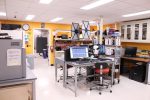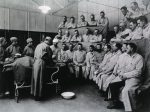- You Can’t Have Science Without Migration: The Rise of Anti-Immigrant Sentiment is Hurting the Scientific CommunityMigration is woven into the fabric of the scientific community. Many scientists move across regions or continents to pursue opportunities for training, education, and collaboration. These journeys affect both an individual’s life and the trajectory of scientific innovation, fostering diversity of thought and new discoveries. However, as anti-immigrant sentiment increases in the United States and… Read more: You Can’t Have Science Without Migration: The Rise of Anti-Immigrant Sentiment is Hurting the Scientific Community
- Platforms, Podcasts, and PoliticsAs someone who grew up chronically online, I never would have guessed that dance videos and SpongeBob memes could be used as tools for teaching science. Yet here we are. Scientists and medical professionals are breaking down complex concepts through TikToks, tweets, and podcasts. Social media has made science approachable and accessible to individuals far… Read more: Platforms, Podcasts, and Politics
- PIT in a Pit: A Guide to Rockefeller’s Most Interactive Resource Center
 Deep in the bowels of The Rockefeller University, through a maze of underground hallways and fickle elevators, is a set of unremarkable brown double doors. A doorbell on the wall glows with a tempting light, beckoning you to press it. Doing so summons a mysterious underground creature known as an “engineer,” a term usually whispered… Read more: PIT in a Pit: A Guide to Rockefeller’s Most Interactive Resource Center
Deep in the bowels of The Rockefeller University, through a maze of underground hallways and fickle elevators, is a set of unremarkable brown double doors. A doorbell on the wall glows with a tempting light, beckoning you to press it. Doing so summons a mysterious underground creature known as an “engineer,” a term usually whispered… Read more: PIT in a Pit: A Guide to Rockefeller’s Most Interactive Resource Center - From Patronage to PolicyScientific research is and always has been deeply entangled with politics, culture, and the broader currents of society. Like most human endeavors, doing science requires materials and manpower, both of which come with a price tag. Thus, funding becomes one of the most direct and potent forces influencing not just what kind of science gets… Read more: From Patronage to Policy
- Bridges Across Worlds: International Voices at the Tri-I
 New York City has long been a beacon for those seeking education, opportunities, and new horizons. As artist Benny Cruz poetically declares, “New York is the end of your past and place of rebirth,” a sentiment that resonates deeply with the countless newcomers who arrive in this city seeking not merely an address change but… Read more: Bridges Across Worlds: International Voices at the Tri-I
New York City has long been a beacon for those seeking education, opportunities, and new horizons. As artist Benny Cruz poetically declares, “New York is the end of your past and place of rebirth,” a sentiment that resonates deeply with the countless newcomers who arrive in this city seeking not merely an address change but… Read more: Bridges Across Worlds: International Voices at the Tri-I - The Myth of Apolitical Science
 The Rockefeller University has a singular mission: to “do good science.” This statement, given by President Richard Lifton at an annual meeting with the Student Representatives Committee (SRC) on May 8, 2024, seems, at first glance, to be an innocuous paraphrase of the Rockefeller University mission statement. If you parse it further, however, it reveals… Read more: The Myth of Apolitical Science
The Rockefeller University has a singular mission: to “do good science.” This statement, given by President Richard Lifton at an annual meeting with the Student Representatives Committee (SRC) on May 8, 2024, seems, at first glance, to be an innocuous paraphrase of the Rockefeller University mission statement. If you parse it further, however, it reveals… Read more: The Myth of Apolitical Science - Trying to Survive as a Scientist Under Shifting Presidential Administrations
 The contentious 2024 U.S. presidential election has had a resounding impact on the social state of the U.S. and broader communities. In a country that seems to be more divided every day, fueled by rhetoric from both sides of the aisle, it is difficult not to question what effect the political environment will have on… Read more: Trying to Survive as a Scientist Under Shifting Presidential Administrations
The contentious 2024 U.S. presidential election has had a resounding impact on the social state of the U.S. and broader communities. In a country that seems to be more divided every day, fueled by rhetoric from both sides of the aisle, it is difficult not to question what effect the political environment will have on… Read more: Trying to Survive as a Scientist Under Shifting Presidential Administrations - Introducing the multitalented Jazz WeismanJazz Weisman’s desk is in the far-right corner of Gaby Maimon’s lab at Rockefeller University, located on the third floor of Flexner Hall. You can recognize his desk based on the myriad of seemingly unrelated items on display: a series of intricate circuit boards and half-assembled custom electronics, a 3D-printed iPhone charging station, a cheat… Read more: Introducing the multitalented Jazz Weisman
- Interview with Hsuan-An ChenHsuan-an (Sean) Chen is a joint postdoctoral researcher at Rockefeller University and Memorial Sloan Kettering Cancer Center. He is currently working in the Charles M. Rice Lab, a lab focusing on virology and infectious disease, at Rockefeller University. He provides an expert cancer biology perspective on the pathology caused by the chronic Hepatitis C Virus… Read more: Interview with Hsuan-An Chen
- ChatGPT is Changing the Way We Do ScienceI started relying on ChatGPT in 2022, when my PI bought a premium account for the lab. I had used the free version in the past, but for $20 a month we gained early access to the latest models and never had to wait for server availability. It didn’t take very long for me to… Read more: ChatGPT is Changing the Way We Do Science
- The Moment I Became a Scientist Was When I Realized That I Should Stay at the TableI was born and raised in a remote small town in southwest China where transportation was inaccessible, and the economy was underdeveloped. People made a living by planting rice and corn or working as migrant laborers. My hometown of Baiquan, situated on a plateau, was surrounded by towering mountains with no end in sight. From… Read more: The Moment I Became a Scientist Was When I Realized That I Should Stay at the Table
- Avery-McCarty-McLeod experiments: The 80th anniversary of identifying DNA as the molecular basis of heredityThe simple but bold 68th Street entrance to the Rockefeller campus was erected in honor of the man who in many ways embodies the scientific and social spirit of the institute. The inscription on one of the piers guarding the entrance reads, and is a homage to the seminal work done over many decades by… Read more: Avery-McCarty-McLeod experiments: The 80th anniversary of identifying DNA as the molecular basis of heredity
- Science Saturday: Where Curiosity Meets CommunityOn September 28, the tenth annual Science Saturday STEM festival brought together students, educators, volunteers, and families for a day to celebrate the wonders of science. Hosted by Rockefeller University’s RockEDU Science Outreach department, the festival again demonstrated how science can be a powerful connector across generations, disciplines, and communities. With over 800 attendees, the… Read more: Science Saturday: Where Curiosity Meets Community
- Rockefeller Reimagines the First-Year CurriculumIn late August, the newest graduate student cohort arrived at Rockefeller University. But most did not set foot in a laboratory until October. Instead, they played the role of an “experimental group” in a reimagined first-year curriculum running throughout September. Prior first-year programming at Rockefeller continued until winter, running in parallel with laboratory rotations and… Read more: Rockefeller Reimagines the First-Year Curriculum
- Healing The Mind and Body: Insights into Complementary and Alternative HealthcareAs one of the world’s leading biomedical research communities, members of the Tri-I appreciate the volume and rigor of research done to seek and support new medical advances. In the U.S., overall life expectancy and survival rates of many diseases have steadily increased thanks to modern medicine. Paradoxically, the general well-being and healthspan of these… Read more: Healing The Mind and Body: Insights into Complementary and Alternative Healthcare
- Eliminating Toxic Aluminum Waste: The Promise of Plasma Hydrogen ReductionAluminum production now has a greener way to deal with its waste. Aluminum is one of the most produced metals in the world. Lightweight and durable, it is a versatile material that can be used to create a wide variety of items, from electric cars to reusable lunch boxes. Aluminum has long been championed as… Read more: Eliminating Toxic Aluminum Waste: The Promise of Plasma Hydrogen Reduction
- Choreographing the Mind: Dancing Scientists Decode the Neurobiology of DanceFeet struck the floor in a percussive staccato. Hands clapped in syncopation with a drumbeat. Wrists flicked. Fingers snapped. It might sound like a scene from a dimly lit Spanish flamenco club, where the scent of tapas and sangria mingles in the air. But in reality, it was a neuroscience lecture/performance featuring Rockefeller’s… Read more: Choreographing the Mind: Dancing Scientists Decode the Neurobiology of Dance
- Trust your Instincts: Gut-Brain Research at Tri-IHave you ever experienced “butterflies in your stomach?” Maybe a “gut feeling” that just cannot be explained? Nerve cells can be found in even more places than the brain or the central nervous system: enter the enteric nervous system (ENS). The ENS, a unit of the peripheral nervous system, is a group of… Read more: Trust your Instincts: Gut-Brain Research at Tri-I
- The Pickleball Experiment: How Courts Created CommunityA silly name for a serious game. Pickleball is a paddle sport invented in 1965 that combines tennis, badminton, and ping-pong into a fast-paced game. The simple rules make it an easy sport to get into for all ages, but a more competitive pickleball scene has quickly overtaken New York City. For young professionals and… Read more: The Pickleball Experiment: How Courts Created Community
- Facing Out: Science Communication at the Tri-IIn recent years, scientists have increasingly recognized the importance of science communication, which can be defined as the practice of informing non-experts about scientific knowledge. The goals and best practices of science communication are continually refined as various institutions study how best to engage with the public. In 2017, the National Academies of Sciences, Engineering,… Read more: Facing Out: Science Communication at the Tri-I
- Who Was Lewis Thomas?Earlier this month, the Rockefeller University awarded Italian physicist Dr. Carlo Rovelli the Lewis Thomas Prize for his exceptional writing about science and philosophy. Dr. Rovelli has authored seven internationally acclaimed books, including There are Places in the World Where Rules Are Less Important Than Kindness (2020) for which he is being honored. The Lewis… Read more: Who Was Lewis Thomas?
- Jeanne Garbarino’s Ecosystem of OutreachJeanne Garbarino, Rockefeller’s Director of Science Outreach, does it all. In the last twelve years, she has fundraised over eight million dollars in collaboration with Rockefeller’s Development office, developed and consulted on dozens of science education and outreach programs across NYC, and trained several hundred scientists spanning every career stage. She’s one of the scientific… Read more: Jeanne Garbarino’s Ecosystem of Outreach
- Henrietta Lacks’ Immortal Story: When Science Forgets HumanityResearch and reporting by Kenny Bradley, Jeannie Carreiro, Colin Burdette, and Sarthak Tiwari Imagine you notice a persistent, painful lump on your cervix. You consult your doctor, who asks your permission to conduct a diagnostic tissue biopsy. You have access to information about this procedure from your doctor, other medical professionals, and online forums. You… Read more: Henrietta Lacks’ Immortal Story: When Science Forgets Humanity
